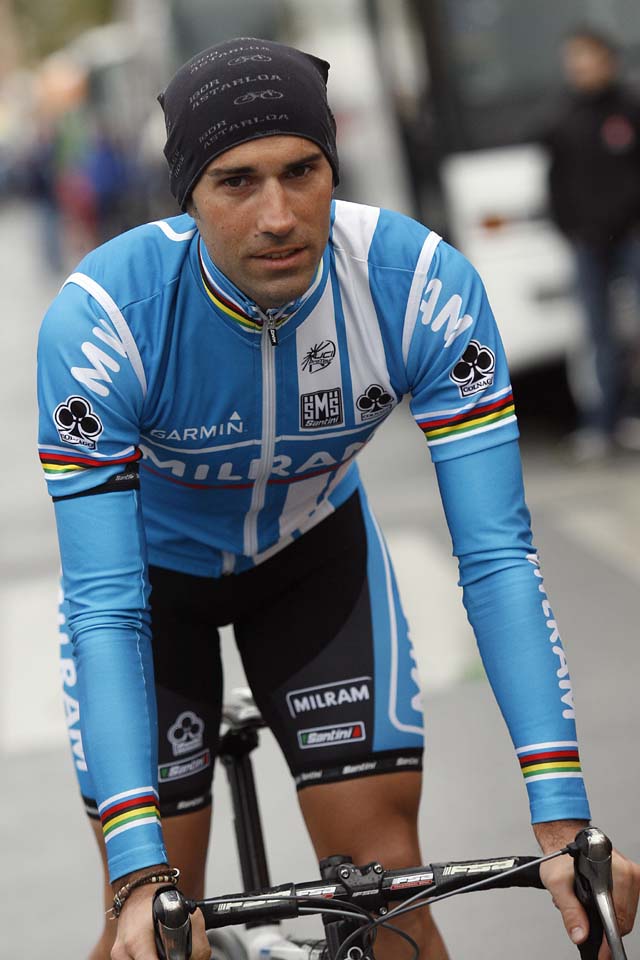Astarloa banned and fined for bio passport anomaly

Former road race World Champion Igor Astarloa has been handed a two-year suspension from competition and a €35,000 fine by the Spanish Cycling Federation for biological passport anomalies.
Astarloa was one of five riders named in June 2009 by the Union Cycliste Internationale who had all displayed irregularities in their biological passport profiles.
The UCI's biological passport system tracks variations in blood and urine values over a long period in an attempt to detect the use of performance enhancing substances or blood transfusions.
Astarloa was the winner of the 2003 road race world championship in Hamilton, Canada, in the same year that he won Fleche Wallonne. Despite being signed by a succession of high profile teams after his Worlds win, Astarloa failed to score any consistent major results.
He raced with Cofidis in the first part of 2004 but had to change teams, to Lampre, after the squad suspended all activitiy because of internal doping problems. In the Giro 2008, he was suspended from his team at the time, Milram, because of allegedly abnormal blood values.
Astarloa was racing for Amica Chips in 2009 when he was suspended by the UCI for irregularities in his passport. He has never, however, tested positive. He announced his retirement from the sport in January this year after he could not find a team.
Astarloa's ban commences from 26 November 2010.
Get The Leadout Newsletter
The latest race content, interviews, features, reviews and expert buying guides, direct to your inbox!
Although it has taken the Spanish Cycling Federation (RFEC) well over a year to sanction Astarloa, the two-year suspension and hefty €35,000 fine is a signal that RFEC is willing to take firm action against riders who break anti-doping rules. However, as Astarloa hasn't raced since May 2009 his suspension could be deemed purely symbolic.
The spotlight is currently on RFEC, which is tasked with studying the evidence in the high-profile case of Alberto Contador, who tested positive for clenbuterol during the 2010 Tour de France. A decision in the case is expected in the next two months.
The other four riders named by the UCI with biological passport anomalies were Spaniards Ruben Lobato Elvira and Ricardo Serrano Gonzalez and Italians Pietro Caucchioli and Francesco De Bonis. Caucchioli received a two-year suspension from the Italian federation in June 2010, but has recently said that he is appealing against the ban with the Court of Arbitration for Sport.
Related links
Italy suspends riders based on UCI's biological passport
Pellizotti out of Giro due to biological passport findings
UCI names five riders over passport anomalies

Thank you for reading 20 articles this month* Join now for unlimited access
Enjoy your first month for just £1 / $1 / €1
*Read 5 free articles per month without a subscription

Join now for unlimited access
Try first month for just £1 / $1 / €1
Founded in 1891, Cycling Weekly and its team of expert journalists brings cyclists in-depth reviews, extensive coverage of both professional and domestic racing, as well as fitness advice and 'brew a cuppa and put your feet up' features. Cycling Weekly serves its audience across a range of platforms, from good old-fashioned print to online journalism, and video.
-
 'It took everything' - Puck Pieterse outclimbs Demi Vollering to win La Flèche Wallonne
'It took everything' - Puck Pieterse outclimbs Demi Vollering to win La Flèche WallonneDutch 22-year-old shows Classics pedigree with first one-day victory
By Tom Davidson
-
 Tadej Pogačar flies to dominant victory at La Flèche Wallonne
Tadej Pogačar flies to dominant victory at La Flèche WallonneSlovenian takes second win at Belgian classic ahead of Kévin Vauquelin and Tom Pidcock
By Tom Thewlis